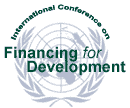
Department of Public Information - News and Media Services Division - New York
18-22 March 2002
 |
International
Conference on Financing for Development Department of Public Information - News and Media Services Division - New York |
|
| Monterrey, NL, Mexico 18-22 March 2002 |
20 March 2002 | |
|
|
|
PRESS CONFERENCE ON ROUND TABLE B2
She said the round table had examined that issue in terms of both the domestic and international financial systems. At home, it was necessary to ensure that, while a minister in charge of agriculture was helping to boost production, his colleague was ensuring a proper market for the increased production. Internationally, financial institutions must actually be working together rather than fighting turf wars. Co-Chair Trevor Manuel, Minister for Finance of South Africa, emphasized the need for greater openness so that the public would know about any contradictions within the system. Also important was the need for a single contact person, as there was too much insistence on talking with different ministers or on interacting with States or governments. Equally important was the need for the people in both the donor and recipient countries to know how resources were being spent. Regarding the issue of selectivity, a correspondent asked how practical it was to expect the World Bank and donors to know which countries were cleaning up their acts. How could politics be kept out of it and what would happen to those countries that failed to clean up? Ms. Herfkens replied that imposing conditionality often did not work, stressing that home-grown programmes were the best bet. There was no point in outsiders trying to get countries to do what they did not want to do. She said some countries in Africa met the good governance and transparency criteria, but still suffered from serious under-funding of their programmes. If that continued, there would be a funding disaster when more countries got their act together, she warned. There was real risk that by 2015 the cheque would still be in the mail. So, while the pledges to reverse official development assistance (ODA) were good news, the bad news was that the amount of money pledged was too little. There was a need to support countries with good policies, linking that support to their own budgets and their own accountability systems. On the other hand, it was important to build the capacity of countries lacking good governance owing to poverty. However, there were those that lacked political will to improve governance because the elites wished to continue stealing from the poor. Another journalist asked whether the United States pledge to increase ODA meant it had accepted the idea of supporting countries with home-grown programmes, since previous administrations had been reluctant to do so. Ms. Herfkens replied that Washington appeared quite open-minded about it. The problem was its very low financial effort. Mr. Manuel added that it was necessary to remove political cynicism from the equation. Donor aid was higher during the cold war than it was now, whereas globalization required greater catch-up funding. Of what concern was the question of Zimbabwe in the context of good governance and of the New Partnership for African Development (NEPAD)? another correspondent asked. Mr. Manuel said a country could decide to be part of NEPAD or not. He urged the journalist to take up the matter with South African President Thabo Mbeki. Mr. Mbeki was expected in Monterrey tonight from London, where he, President Olusegun Obasanjo of Nigeria and Australian Prime Minister John Howard had decided on Zimbabwe's suspension from the Commonwealth. President Mbeki had also been closely involved with the NEPAD initiative, he added. Earlier, Susan Markham, Spokeswoman for
the International Conference on Financing for Development, told correspondents
that the speakers' list for tomorrow's Summit meeting would be published
again as there were a few changes. Simultaneously, there would be a
round table of heads of State starting at 10 a.m. Later, the President and First Lady of Mexico would host a dinner, she said. Details were at the back of the Journal. The Spokeswoman told another correspondent that she had received no official word on whether President Fidel Castro was coming. About Friday's programme, Ms. Markham said it would be very similar to that of tomorrow, but there would be no round tables. However, there would be a retreat for heads of State organized by the President of Mexico at the Museum of Mexican History. After that, President Fox would give a press conference in the briefing room. Details of any closing press conference would be posted, she said. Press Releases Conference News |